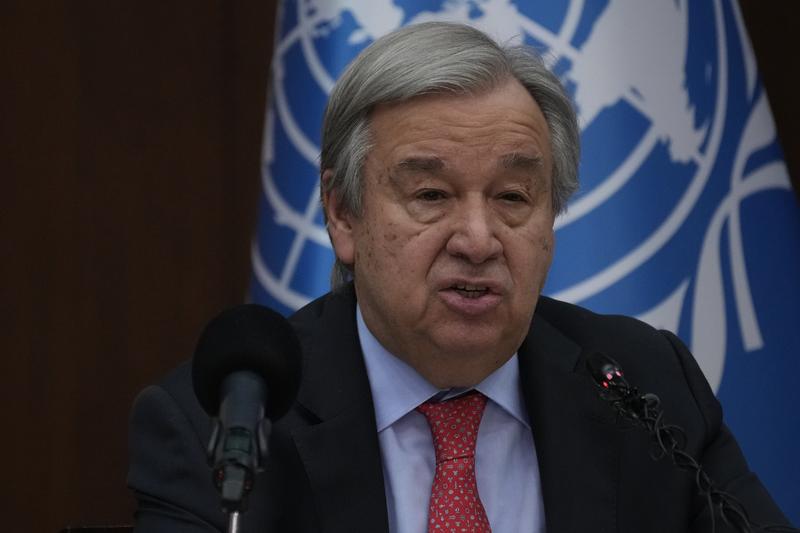 United Nations Secretary-General Antonio Guterres speaks to reporters during a news conference, in Baghdad, Iraq, Wednesday, March 1, 2023. (PHOTO / XINHUA)
United Nations Secretary-General Antonio Guterres speaks to reporters during a news conference, in Baghdad, Iraq, Wednesday, March 1, 2023. (PHOTO / XINHUA)
UNITED NATIONS - UN Secretary-General Antonio Guterres on Thursday proposed strengthening the international response to complex global shocks through an "Emergency Platform."
The global response to such shocks is often ad hoc, fragmented, and improvised. There is a need for a mechanism to tackle multidimensional threats with a multidimensional response, he said in his presentation of a policy brief for the Summit of the Future scheduled for 2024.
"Our global interconnectedness means that shocks that occur in one country or sector can quickly have cascading consequences elsewhere, often in unforeseen ways. Those shocks are coming at us with greater strength and frequency, with serious implications for peace and security, economic stability, and environmental sustainability," he said.
Those shocks can have a disproportionate impact in some areas. Both the COVID-19 pandemic and the global cost-of-living crisis hit the poorest and most vulnerable hardest, throwing Sustainable Development Goals (SDG) progress and Agenda 2030 further off-track, he added.
For the sake of a more formal, predictable, and structured approach, the Emergency Platform would leverage the United Nations' convening power and capacities in a timely and predictable way. It would identify and bring together actors at the appropriate level to respond. It would be flexible and agile, responding to different types of shocks. Crucially, it would promote a global response based on solidarity and equity, and the key principle of leaving no one behind. All people and countries hit by a shock must have access to the support they need, said Guterres.
Accountability would be built into the Emergency Platform, in order to hold all parties to their concrete commitments, he said.
ALSO READ: UN, Ukraine call for extension of Black Sea Grain Initiative
The "Emergency Platform" would not displace or duplicate the work of intergovernmental bodies, including the Security Council, said UN Secretary-General Antonio Guterres
While decisions would continue to lie with member states, the Emergency Platform would also include the private sector, civil society, and other non-state partners with an ability to contribute to the global response.
But he clarified that the Emergency Platform would not be a standing entity or body. It would, instead, consist of a set of protocols around convening key actors in the event of complex, global shocks, and operationalizing their coordinated response.
The Emergency Platform would not displace or duplicate the work of intergovernmental bodies, including the Security Council. Nor would it interfere with the mandate of specialized agencies or existing mechanisms. It would be a tool for the multilateral system to support intergovernmental decisions and complement existing mechanisms, he said.
The United Nations is the only organization that can bring together all stakeholders in the event of complex global shocks, and has them work together to the best effect. It is time to take decisions that enable it to do so, said the UN chief.
Another policy brief presented to UN member states by Guterres concerns how to take the future into account in decision-making and deliver on responsibilities to generations yet to be born.
ALSO READ: UN warns of aid cuts over Taliban crackdown on women's rights
"Achieving the SDGs, upholding the rights and meeting the needs of people alive today are clearly preconditions for a better future. At the same time, we must make those decisions with an eye on the future, recognizing the rights and interests of people who are not yet born," he said.
Most members of future generations will be born in countries that are currently low- and middle-income ones. They are likely to live in places that are already suffering the effects of poverty, hunger, the climate crisis, crippling debt, discrimination and inequality. The policy brief makes it clear that a secure and equitable future starts now, he said. "Considering the future pays off in the present."
The policy brief proposes three concrete steps at the global level.
First, it proposes the appointment of an envoy who will be the global voice for future generations, raising awareness about the impacts on them of the decisions that are taken today.
Second, it proposes ideas to inform a political declaration defining duties to the future. This would be an opportunity to consolidate the commitments already made to future generations and to adapt these commitments to new challenges.
ALSO READ: UN appeals for humanitarian access amid clashes in Somalia
Third, it proposes a dedicated intergovernmental forum, where member states could advance the commitments in the declaration and share experiences and innovations. The brief, therefore, recommends the establishment of a Commission on Future Generations as a subsidiary organ of the General Assembly.
"These first two policy briefs start our contribution to the consideration by member states of the decisions and changes needed to equip the multilateral system for the challenges of today and the future," said Guterres.
Nine more policy briefs for the Summit of the Future will be published by July.
The goal is simple: to breathe new life into the multilateral system so that it can deliver on the promises of the UN Charter and the 2030 Agenda, he said. "As our world becomes more complex, more uncertain, and more dangerous, we have an even greater responsibility to strengthen the multilateral system. That must be the ultimate aim of the Summit of the Future."
The SDG Summit this September and the Summit of the Future in 2024 are key moments for member states to come together around the decisions necessary to put the world back on track to a fair, inclusive, and sustainable future for all, he said.


